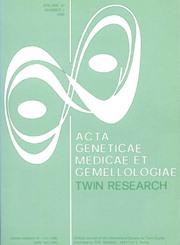No CrossRef data available.
Article contents
Influence of Mouse-Strain-Specific Factors on Position-Dependent Transgene DNA Methylation Patterns
Published online by Cambridge University Press: 01 August 2014
Extract
In previous work from this laboratory, an inverse dependence was established for the adenovirus type 2 E2A late promoter between sequence-specific DNA methylation and promoter activity [1-5; for reviews see ref. 6, 7]. The effect of DNA methylation on promoter activity was also assessed in the transgenic mice, which were obtained from microinjections of unmethylated or in vitro HpaII-premethylated pAd2E2AL-CAT DNA [1] into F2 zygotes from B6D2F, (C57BL/6 × DBA/2) hybrid mice. In CAT assays carried out on organ extracts from the pAd2E2AL-CAT mice, the inverse relationship was confirmed [2].
We studied the stability of the pAd2E2AL-CAT DNA methylation patterns in up to eight mouse generations and assessed the influence of the strain-specific genetic background. Three pAd2E2AL-CAT mouse lines were crossed with inbred DBA/2, C57BL/6 or B6D2F, mice. Parent-of-origin effects were controlled by exclusive hemizygous transgene transmission either via females or males. The founder animal of line 7-1 carried two groups of transgenes (A and B) on separate chromosomes. The transgene methylation patterns of the 7-1B transgenes and those of the lines 5-8 and 8-1 were stably transmitted.
Southern blot hybridization experiments [8, 9] revealed that the 7-1A transgene methylation pattern was a cellular mosaic. In mixed-genetic-background offspring from 7-1A animals, 10% carried transgenes with HpaII-DNA methylation levels that were reduced from 40 to 10-15%. This finding suggested that in this background the factors that supported high methylation levels were dominant. When inbred DBA/2 mice were the mates, 40% of the siblings carried demethylated transgenes, whereas this ratio amounted to only 10% in C57BL/6 offspring (comparable to B6D2F1 crossings). Transgene methylation patterns were not detectably influenced by the parent-of-origin.
- Type
- Research Article
- Information
- Acta geneticae medicae et gemellologiae: twin research , Volume 45 , Issue 1-2 , April 1996 , pp. 243 - 244
- Copyright
- Copyright © The International Society for Twin Studies 1996


